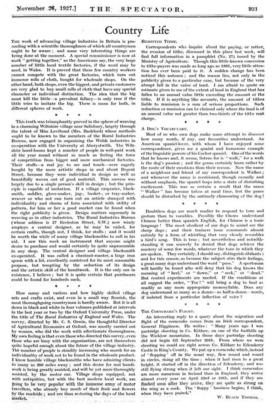This truth was triumphantly proved in the sphere of weaving
in a charming Wiltshire village near Salisbury, largely through the talent of Miss Lovibond (Mrs. Bashford) whose methods ought to be known to the members of the Rural Industries Bureau, now engaged in organizing the Welsh industries in co-operation with the University at Aberystwith. The Wilt- shire hand-looms kept a number of people in well-paid work all the year round without so much as feeling the force Of competition from bigger and more mechanical factories. Their stuffs—a real joy to see and touch—were "eagerly bought by the more artistic shops in and about Regent Street, because they were individual in design as well as beautifully woven out of good material. This success was largely due to a single person's skill in design ; but the prin- ciple is capable of imitation. If a village carpenter, black- smith; saddler, glove-maker, jug-, basket-, or tray-maker, weaver or who not can turn out an article stamped with individuality and charm of form associated with utility of pattern, for him or her a good market can be found when the right publicity is given. Design matters supremely in weaving as in other industries. The Rural Industries Bureau ( whose address is 27 Eccleston Street, S.W.) now wisely employs a' central designer, as he may be called, for certain crafts, though not, I think, for stuffs ; and it would be worth the while of many village blacksmiths to call in his aid. I saw this week an instrument that anyone might desire to purchase and would certainly be quite unprocurable in any shop. The central designer and village blacksmith co-operated. It was called a chestnut-roaster, a large iron spoon with a lid, excellently contrived for its most seasonable purpose, but tempting by the seduction of its design and the artistic skill of the handiwork. It is the only one in existence, I believe ; but it is quite certain that purchasers could be found for hundreds such.
* * * *






















































 Previous page
Previous page